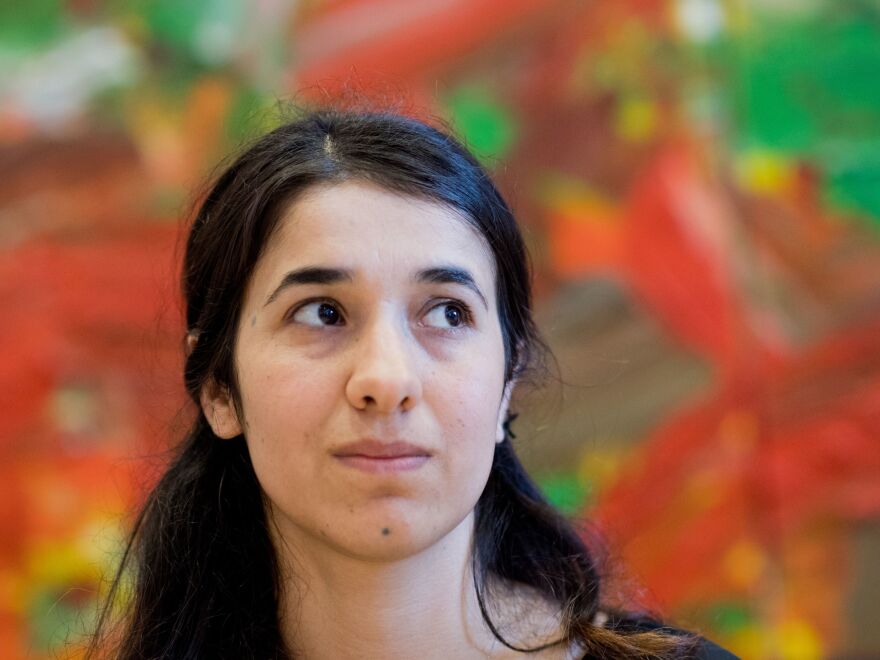Updated at 3:40 p.m. ET October 17
This month, Nadia Murad became the co-recipient of the Nobel Peace Prize, along with Dr. Denis Mukwege, a gynecologist from the Democratic Republic of the Congo who treats victims of rape.
The pair were named for their work to highlight and eliminate the use of sexual violence as a weapon of war. Murad, who had been captured and sexually enslaved for three months by ISIS members, was honored for refusing "to accept the social codes that require women to remain silent and ashamed of the abuses to which they have been subjected," the Nobel committee said. At age 25, she is the second-youngest peace prize recipient; Malala Yousafzai was the youngest at age 17.
On Wednesday, October 17. Murad spoke with Morning Edition's Noel King. We have updated a previously written profile to reflect her comments.
The announcement of the Nobel prize brought tears to Murad's eyes, she told NPR's King.
"When I received this news ... the first thing I did was look at [her mother's] picture and cry because I felt that I needed her — and not just her but the 80 women that were with her. The 80 older women that were with her and they were all executed for no reason. Just for being Yazidi and being older."
Nurad's mother is one of several family members who were killed by ISIS. The family is part of the Yazidi minority in northern Iraq.
Murad herself has her own harrowing story to tell. In August 2014, she was one of thousands of Yazidi captured by ISIS and forced into sexual slavery. Three months later, she escaped through a door that a captor left unlocked.
Murad has shared her painful story with international media outlets over and over to show the world what happened to Yazidis. She has become a voice for captive women and girls in the process.
Murad urges women who have faced sexual violence to reclaim their lives. "The hope of ISIS was to break the Yazidi community," she says. "But for survivors especially, going back to their lives and getting married and making a life and working, it's basically making sure ISIS did not succeed."
In 2016, she was named the U.N.'s first Goodwill Ambassador for the Dignity of Survivors of Human Trafficking.
U.N. Secretary-General Ban Ki-moon has praised her courage.
"Nadia survived horrific crimes. I cried when I heard her story. But I didn't only cry out of sadness," he said. "I was also moved to tears because Nadia has so much strength, courage and dignity. She rightly calls for a world where all children live in peace."
Murad tells King that the Yazidi are a peaceful people — and that she wants to see justice done.
"We would like to see this never happen again to any other community or any other religion or any other group," Murad says. "We have the right to speak about this. We have the right to deliver our message ... I deliver my message with a clear conscience that I advocate for people."
She labels the rape of women and the murder of men from her community as genocide — and says she wants these atrocities to be classified as war crimes. But she's uncertain this will happen.
"Sometimes I feel that my message has not been clearly heard .... Too much is going on in terms of women being victims. And it's not the first time and certainly it's not the last time. So I feel like this is not new to people ... people have become numb to this kind of news."
Yazidi women and girls who have escaped ISIS or are rescued face an array of problems, Pari Ibrahim, founder and executive director of the Free Yezidi Foundation, tells NPR. "A lot of the women have difficulty trying to build a new future. They don't have a boyfriend or get engaged; they are living in the past. It's not easy for them to switch back to the here and now and to live daily life."
Murad, who has tried to loosen shackles of the past, announced in August her plans to be married.
Her fiancé, Abid Shamdeen, is a former interpreter for the U.S. Army and a human rights activist. "Despite all the difficulties that we were going through, he was always there. He was supportive," Murad told NPR at the time.
Shamdeen said of Murad: "Obviously she's a very brave woman. She is courageous, she's smart, she's strong. And she's a fighter."
Murad says their engagement shows Yazidi survivors that "it's possible to live their lives again and to not believe the propaganda of ISIS — that they will not be accepted back into the community."
But she says she is still getting used to her new way of life.
"It's still difficult for me to deal with all of this ... I want to create a family with my fiance and be able to live a simple life. And just be safe," she says.
Copyright 2020 NPR. To see more, visit https://www.npr.org. 9(MDAwMTM1NDgzMDEyMzg2MDcwMzJjODJiYQ004))



